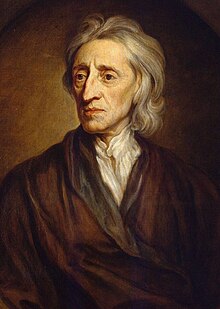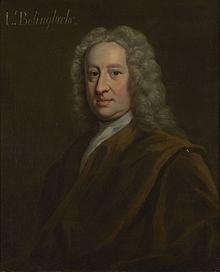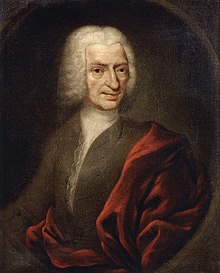deism
As deism [de'ɪsmʊs] (God's teaching ', from the Latin deus ' god') refers to a conception of religion, according to which only reasoning not have the authority of revelation , can serve to legitimate theological statements. The deistic ideas about God are very different. In a narrower sense, deists are those who accept the divine as the “origin of all that is”, but regard concrete divine intervention as “incapable of justification”. In a broader sense, deism is viewed as a free-thinking stream of faith in the Age of Enlightenment .
Definition
The terms deism and deist appeared in France around the mid-16th century. They are learned word formations derived from Latin. The oldest evidence comes from the Instruction Chrestienne , which the reformer Pierre Viret published in Geneva in 1564. The terms were then mainly used in Great Britain. In German, Deist is attested for the first time in 1683, Deism from 1711.
What they have in common with theism is that both assume a God who made creation. The difference lies in the further behavior of God: While deism assumes that God does not intervene further in the world, theism assumes that God can intervene in the world as a causal cause at any time. For deists there are no miracles (an event that contradicts the laws of nature) and ultimately no revelation . An influencing God such as in the Book of Job would also be in conflict with the free will of man. While deism postulates a complete separation of God and the world, pantheism assumes that God and the world ultimately form a unit.
history
Numerous enlightenment thinkers spread a form of deism. Gottfried Wilhelm Leibniz spoke of God as a clockmaker who started the perfect clockwork he had made, which has been running by itself ever since. John Locke , one of the main exponents of empiricism , founded a natural belief in God , with Christian connotations, with perceptions and reflections. Voltaire represented a tolerant, rationalistic belief in God, Jean Jacques Rousseau's natural religion was not based on revelations and books, but his knowledge of God resulted from his own experience and reason ( raison ).
In addition to religious-philosophical considerations since antiquity , deism has as an important source anti-Trinitarianism or Unitarianism , which was widespread as socinianism in Europe in the 17th century . Siegfried Wollgast described Socinianism as the "direct precursor" of Deism.
England
In England, where socinianism had been threatened with death since 1664, the Free Thinker movement developed and the term deism emerged in the early second half of the 17th century . The main exponents of deism, such as John Locke or his student John Toland , were primarily concerned with opposing “natural” laws of reason with the belief in revelation .
Isaac Newton explained the forces of nature through the intervention of God (spiritual forces). Leibniz objected that Newton viewed God as a bad watchmaker who did not complete his work. This was an expression of classical deism. The old watchmaker's argument, which saw creation as an expression of divine planning, is intensified. God only gave the world a plan at the beginning. Any subsequent intervention on his part is interpreted as a defect in the original creation.
For Lord Henry Bolingbroke , Christianity and the Church were merely means used by the state to keep man's instincts in check. Only to the extent that Christianity can be reconciled with the principles of reason does it contain truth. Faith in the church, on the other hand, is nothing but human work, is only upheld for reasons of state welfare and is deceptively conveyed to the superstitious people as a divine commandment by well-paid pastors .
Matthew Tindal published Christianity as old as Creation in 1730 ; or, the Gospel a republication of the religion of nature , which became very well known and was soon considered the Bible of Deism . Of all religions, he considered only one Christianity freed from revelation, the deistic original religion, to be true. The Bible is the document of this natural religion , which is to be interpreted rationally. He rejected miracles and prophecies , which are described in the Bible, as well as any anthropomorphic conception of God . He described revelation as a fraud that had been foisted on the world by priests. The religion should be based on moral principles and take a tolerant attitude towards those who think differently, with the exception of atheists who want to destroy the religion. In 1741 the text was translated into German and thereafter gained some influence in enlightened Protestant circles in the German states. A book by Tindal was burned in 1710 at the behest of the House of Commons.
A friend of Locke's, Anthony Collins , also advocated a deistic belief in God and was therefore attacked and persecuted like Bolingbroke and Tindal, so that he had to leave Great Britain several times. He found refuge in the Netherlands.
The Irish philosopher and theologian George Berkeley formulated - following Locke and René Descartes and in contrast to Newton and Leibniz 'watchmaker image - idealistic deistic theses: Nature and existence have their origin in God and exist through God. Man develops ideas through his perceptions, which God's Spirit produces in him. Even David Hume's philosophy of religion works The Natural History of Religion (The Natural History of Religion) in 1757 and the posthumously published Dialogues Concerning Natural Religion have deistic tendencies.
In some countries there were Deists in the Masonic movement , for example Voltaire in France, Thomas Paine , one of the founding fathers of the United States, and Thomas Jefferson , author of the founding declaration and 3rd President of the USA, who campaigned for the separation of religion and state. In his work Age of Reason (Age of Reason) Paine established his unitarian belief in only one God and linked it with the hope of "a happy state after this life". According to Paine, true religion is to act righteously , show compassion, and make others happy. In both England and France he came into conflict with the state powers and was exposed to persecution, so that he finally returned to the USA.
Germany
Deism was less widespread in enlightened absolutism in large parts of Germany than in its country of origin. Besides Adam Weishaupt , the founder of the Illuminati Order , Hermann Samuel Reimarus should be mentioned. He was a pioneer in biblical criticism, but held back in public. The fragments of his writings (fragments of an unnamed) published by Gotthold Ephraim Lessing between 1774 and 1778 led to the so-called fragments dispute, the most important polemical argument between the Enlightenment and more or less deist positions, combined with detailed radical biblical criticism on the one hand and Protestant orthodoxy on the other side. The main opponents were Lessing and Johann Melchior Goeze .
See also
swell
- Thomas Paine : The Age of Reason. Book Tree, San Diego 2003, ISBN 1-58509-213-4
- Matthew Tindal : Christianity as Old as the Creation. Frommann, Stuttgart-Bad Cannstatt 1967 (reprint of the London 1730 edition)
literature
Overview representations in manuals
- Edward Baert: Deism. In: Hans Jörg Sandkühler (Ed.): Encyclopedia Philosophy. Volume 1, Meiner, Hamburg 2010, ISBN 978-3-7873-1999-2 , pp. 355-358
- Peter Byrne et al: Deism. In: Religion Past and Present . 4th, revised edition. Mohr Siebeck, Tübingen 1999, ISBN 3-16-146942-9 , Sp. 614-623
- Günter Gawlick : Deism. In: Historical Dictionary of Philosophy . Volume 2, Schwabe, Basel 1972, Sp. 44-47
- Christof Gestrich : Deism . In: Theologische Realenzyklopädie (TRE). Volume 8, de Gruyter, Berlin / New York 1981, ISBN 3-11-008563-1 , pp. 392-406.
- Ernest Campbell Mossner: Deism. In: Donald M. Borchert (Ed.): Encyclopedia of Philosophy , 2nd Edition, Volume 2, Thomson Gale, Detroit et al. 2006, ISBN 0-02-865782-9 , pp. 680-693
- John Vladimir Price: Deism. In: The Continuum Encyclopedia of British Philosophy. Volume 2, Thoemmes, London / New York 2006, ISBN 1-84371-141-9 , pp. 809-812
Overall presentations and investigations
- Peter Byrne: Natural Religion and the Nature of Religion. The Legacy of Deism. Routledge, London / New York 1989, ISBN 0-415-04104-X
- Christopher Voigt: The English Deism in Germany. A study of the reception of English deist literature in German magazines and compendia of the 18th century. Mohr Siebeck, Tübingen 2003, ISBN 3-16-147872-X
Web links
- Anonymous: English Deism. In: Internet Encyclopedia of Philosophy .
- Anonymous: French Deism. In: Internet Encyclopedia of Philosophy .
Individual evidence
- ↑ a b c Peter Knauer: Faith comes from hearing. Ecumenical Fundamental Theology, Styria, Graz / Vienna / Cologne 1978, p. 49 ff.
- ^ Günter Gawlick: Deism. In: Historical Dictionary of Philosophy , Volume 2, Basel 1972, Sp. 44–47, here: 44.
- ^ Heidrun Kämper: Deist. In: Hans Schulz, Otto Basler (eds.): German Foreign Dictionary , 2nd, revised edition, Volume 4, Berlin 1999, pp. 128–132.
- ↑ Kurt Flasch: The devil and his angels. The new biography , CH Beck, Munich 2015, p. 310 ff.
- ^ Siegfried Wollgast. Philosophy in Germany between Reformation and Enlightenment, 1550-1650 , 2nd edition Akademie Verlag, Berlin 1993, ISBN 3-05-002099-7 , p. 414.



